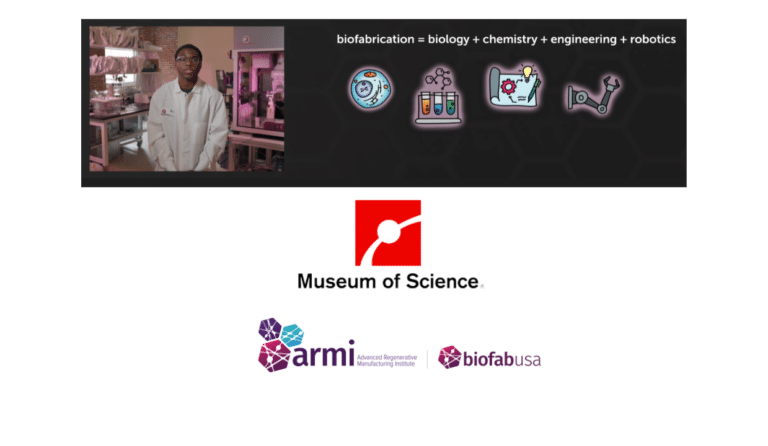“Regenerative medicine has the potential to fundamentally change how we think about disease and injury through its ability to save lives and restore function,” says Dr. Amy Peterson, Associate Professor of Plastics Engineering at the University Massachusetts, Lowell.

UMass Lowell became a member of ARMI in 2018 when Dr. Peterson joined the University from WPI. Dr. Peterson is actively working on an ARMI funded project, stemming from her work at WPI. UMass Lowell is active in many of the Manufacturing USA institutions and heard of the formation of ARMI BioFabUSA through the network.
Sarah Kostanski, Technical Program Manager at UMass Lowell said, “It has been a great partnership, especially with UMass Lowell’s growing Biomedical Engineering department and work in manufacturing processes for the biotechnology industry.” The University’s education, workforce development and R&D efforts in biotechnology leverage the faculty’s expertise in bio-manufacturing, advanced biomaterials, renewable polymers, biosensors, imaging, automation, electronics, 3D printing, data analytics and advanced computing.
Through exploratory and practical research, UMass Lowell’s faculty translates discoveries into powerful solutions with their world-class facilities and research infrastructure. Working across disciplines, faculty members collaborate with industry, startups and communities to innovate and build solutions that make a difference in peoples’ lives. “As we continue to build new cutting-edge research facilities such as the Fabric Discovery Center, our capacity to conduct groundbreaking research grows and attracts leaders from around the world,” said Dr. Peterson.
The Core Research Facilities (CRF) at UMass Lowell offer users imaging, analytical, and fabrication resources in multiple areas. These areas include, but are not limited to, surface and bulk properties testing, nanofabrication, nanotechnology, materials characterization, chromatography, mass spectroscopy, robotics and pilot-scale lyophilization. In 2012, UMass Lowell opened the Emerging Technologies and Innovation Center (ETIC) which is part of the CRF and houses cutting-edge programs in nanomedicine, nanomanufacturing, plastics and elastomers, clean-room technologies, biomaterials development and more. ETIC helps connect faculty and students with industry leaders embedded within the facility.
“We are excited about the research in this area and contributing to advancing science and the state of the art, including through collaboration with industry partners. We are also excited about regenerative medicine as a growing field, especially in Massachusetts, and finding ways that we can contribute to workforce development and outreach,” said Dr. Peterson.
As a member of ARMI, UMass Lowell aims to collaborate with industry and other universities to build on their founding tradition of innovation, entrepreneurship and partnerships to address challenges facing the region and the world. UMass Lowell is particularly interested in opportunities that allow the university to combine research and/or education through workforce development activities or collaborating with Massachusetts-based organizations that serve the Commonwealth.
“This is a very exciting time in the regenerative medicine industry,” said Dr. Peterson. “ARMI BioFabUSA brings together diverse groups of stakeholders to facilitate large-scale manufacturing in this field, which requires innovative approaches that ARMI supports through its project calls and is necessary for the continued advancement of regenerative medicine.”






